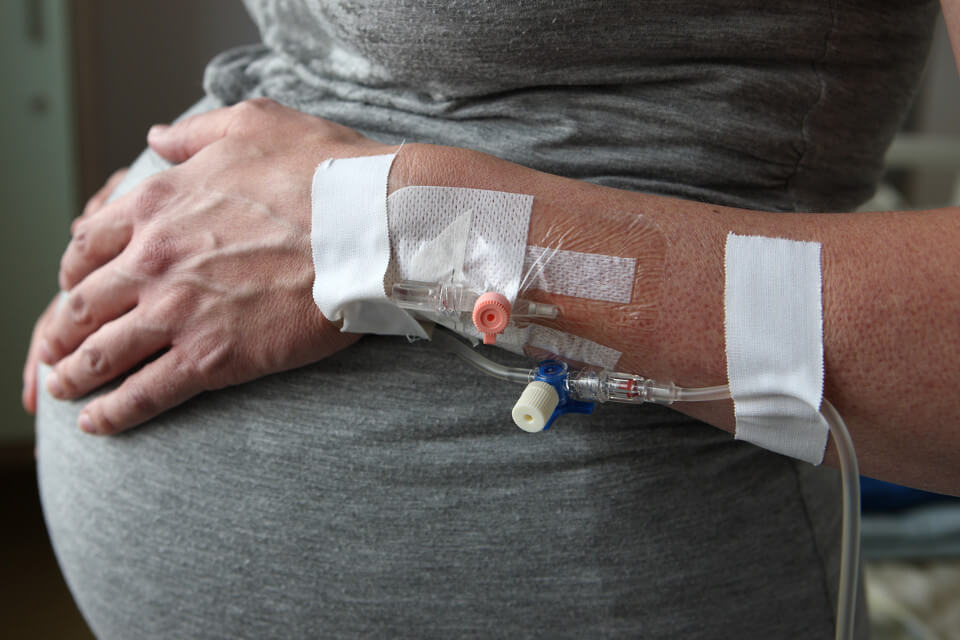Study finds mums who suffer from pregnancy sickness tend to have kids with higher IQs
Pregnant women who are feeling nauseous, hang in there – there’s a light at the end of the tunnel!
Many expecting mums can’t help but worry if their sickness is affecting the amount of nutrients their baby is getting and whether or not it will affect their little one’s development, but now a new study has found the opposite.
Researchers at the Hospital for Sick Children in Toronto, Canada, found that mums who suffer from severe morning sickness during pregnancy tend to have kids with sharper minds.
Scientists find mums who suffered from morning sickness tend to have children with higher IQs
Researchers looked at 121 children between the ages of three and seven, many whose mothers suffered from morning sickness during their pregnancy.
Rather than falling behind, experts found that these children were more likely to have scored higher on IQ, memory and language skill tests.
All children in the study scored within the normal range for mental development.
One in two pregnant women will experience sickness in varying degrees throughout their pregnancies, and one in 50 suffer from extreme sickness such as hyperemesis gravidarum.
 Nausea and vomiting during pregnancy is very common, particularly in the first trimester and it is related to changes in particular hormones that are needed for the placenta’s development, one theory is that morning sickness is a sign of a healthy pregnancy.
Nausea and vomiting during pregnancy is very common, particularly in the first trimester and it is related to changes in particular hormones that are needed for the placenta’s development, one theory is that morning sickness is a sign of a healthy pregnancy.
However, no one truly knows what causes pregnancy sickness.
Researchers believe that pregnancy hormones related to morning sickness have positive effects on fetal brain development.
“[The findings suggest that] nausea and vomiting in pregnancy is not harmful and in fact may enhance favourably children’s long-term [mental development],” lead researcher Dr Irena Nulman told Reuters Health.
 Facts about morning sickness
Facts about morning sickness
- While we all like to joke that morning sickness should be called all-day-sickness, it is generally worse earlier in the day.
- It usually kicks in at around the fourth week of pregnancy and starts to improve and even disappear at about the 12th to 14th week.
- One in five women will continue getting morning sickness into their second trimester.
- Some will have it right until they have their baby.
- Generally, it won’t harm you or your baby – unless it’s an extreme case.
Symptoms
- For some women, it starts as a general nauseous feeling in the belly.
- A lack of appetite.
- Vomiting
- It can also have more serious impacts, such as depression and anxiety. This can be due to the impact on the quality of your life when you are constantly feeling sick and vomiting, leaving you unable to work or function properly. If you are feeling like this, make sure you see your doctor.
 What causes morning sickness?
What causes morning sickness?
Interestingly, science still hasn’t been able to pinpoint a reason for morning sickness, but it’s thought things like hormones, blood pressure fluctuations, altered metabolism and chemical changes all play a role.
A study by a Cornell University grad student and his adviser found that meat, fish, poultry and eggs are big morning sickness triggers for women. We’re told to avoid some of these foods in pregnancy if prepared in certain ways (for instance raw egg). The reason scientists believe even just the smell of some of these things makes us nauseous when we’re pregnant is actually evolutionary – meat was once a food that would have carried many parasites.
Will it harm your baby?
According to Better Health, while vomiting may cause you some soreness in the abdominal muscles, this won’t physically harm your baby.
There are schools of thought that morning sickness is a good sign of a healthy baby, and there are studies that have linked moderate morning sickness with a reduced risk of miscarriage. But vomiting that continues for a long time and leads to weight loss and dehydration can cause some risks to both you and baby, so seek medical advice.
Does it mean I’m having twins? Or unlikely to have a miscarriage?
There are some studies that have suggested a link between human chorionic gonadotropin (HCG) and morning sickness. Because HCG is higher in women who are pregnant with multiples, it’s thought they may suffer worse morning sickness.
 Hyperemesis gravidarum (HG)
Hyperemesis gravidarum (HG)
Severe morning sickness is known as hyperemesis gravidarum (HG) and was given a much wider audience after the Duchess of Cambridge suffered it with her first pregnancy. Persistent vomiting can lead to weight loss and dehydration requiring hospitalisation.
According to Better Health, untreated cases of HG can lead to:
- Electrolyte imbalances
- Extreme depression and anxiety
- Malnourishment of the fetus
- Excessive strain on vital organs, including the liver, heart, kidneys and brain.
Helping ease morning sickness
Here are some suggestions on how to try and beat nausea :
- Try and get some food in your tummy before you get out of bed – something like dry crackers or water may help.
- To try and keep nausea at bay, eat small meals often throughout the day.
- Avoid fatty foods and coffee.
- Eat when you feel like it, don’t wait for meal times.
- Ginger has been known to help ease feelings of nausea.
- If the smell of food is putting you off, get someone else to prepare your meals.
- You can also try The Healthy Mummy Smoothie!
- Drink lots of water – six to eight glasses a day. If you’re vomiting a lot, make sure you up your fluid intake.
- You can try acupressure wristbands that are designed for travel sickness.
Join our Community of Supportive Mums!!


 Facts about morning sickness
Facts about morning sickness What causes morning sickness?
What causes morning sickness? Hyperemesis gravidarum (HG)
Hyperemesis gravidarum (HG)

